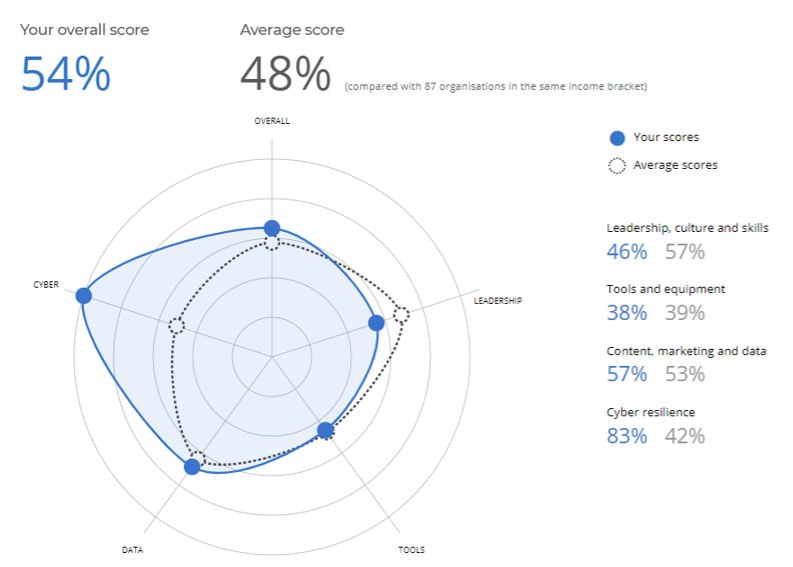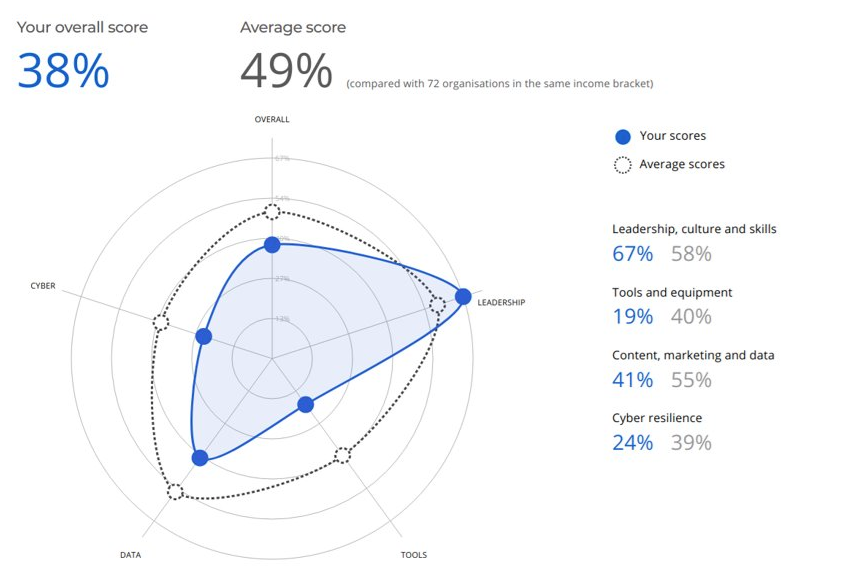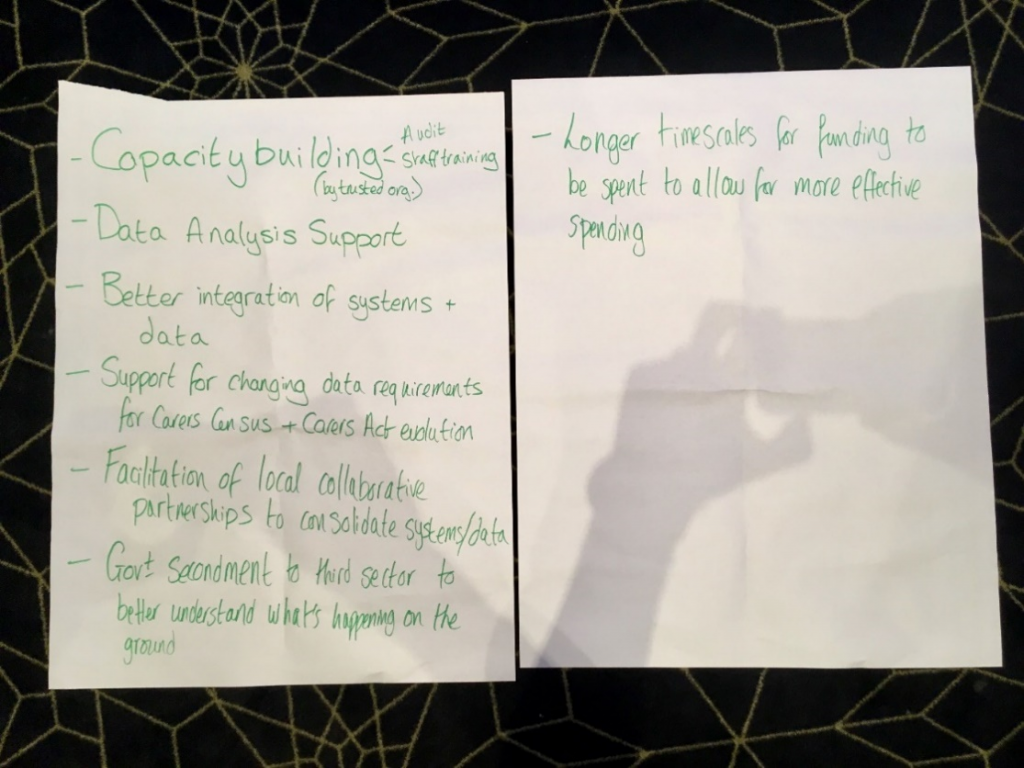CATS fund – Digital Accelerator
Overview:
There are an estimated 788,000 unpaid carers in Scotland, including 44,000 carers under the age of 18. A network of over 60 local carers centres exist across the Scotland to provide support services to carers in their local communities. These organisations range in size and scope but will usually have a small core staff team and an active volunteer programme. The Carers Act (2016) places new engagement and reporting requirements on Carers Organisations. For example, producing a Carer Support Plan for all adult carers, and a Young Carers Statement for all young carers.
In 2018 The Scottish Government introduced a new fund (the Carers Act Transformation Fund), administered by SCVO, designed to cover the costs of ‘transformation’ to meet these new requirements. The funding was not designed to support service delivery or staffing costs, but rather to purchase items such as kit, software and specific training. Support for designing and delivering services was available through alternative funding routes.
Running in parallel to this fund, the digital team at SCVO have a programme of activity designed to support a Digitally Confident Third Sector in Scotland. One of the key lessons we have learnt from this work is that organisations need support to fully understand the potential of new digital approaches, and to prioritise the steps in their own change journey.
The CATS fund
The initial uptake of the fund was lower than expected, and this was mitigated by opening a second round of applications. SCVO reflected on the possible reasons for this low uptake in the interim evaluation report:
“a lack of digital awareness could have been a contributing factor.”
This lack of awareness can manifest in several ways. For some organisations the term ‘digital’ or ‘transformation’ can be off putting, and they may feel they don’t need any support as they are already managing well. Others might simply not know where to begin and feel unable to develop a plan that will really benefit the organisation.
This chimes with SCVO’s wider experience of supporting digital change and transformation with third sector organisations.
There was a small underspend at the end of the 2018/19 funding period, and SCVO was able to use this to deliver a Digital Accelerator programme for organisations that had been successful in securing CATs funding.
Participating organisations
Twelve organisations took up a place on the two-day residential course. This self-selecting group represented urban and rural communities, and delivered a wide range of services to support Carers.
All of the organisations had used the CATs funding as designed, to purchase kit and make improvements to the software and data reporting capabilities. For example one organisation moved to a new CRM system, another purchased iPads with mobile connectivity for their support staff.
Ahead of the accelerator the organisations were asked to complete SCVO’s digital checkup, to give an indication of the level of digital confidence in their organisation. This highlighted the range of knowledge and current practice. For example, this organisation scored well on cyber resilience, but was weaker on leadership:

This organisation had a different pattern:

Learning:
What did SCVO learn?
- Our core themes are still the right ones
We frame our support around these key themes:
- Leadership and culture
- Flexible technology
- Service design
- Data
- Cyber risk and social harm
These topics have come from our wider work across Scotland. Feedback from the accelerator demonstrates that they are relevant and important to Carers Organisations and can help to frame and develop a digital change action plan.
- We need to work with the willing
Many small third sector organisations are facing funding challenges and increased demands on their existing services. This can mean they are very focused on ‘keeping the lights on’ - taking time out to engage with support for digital evolution can feel a bit abstract and can therefore be a challenge. This can mean we are not able to reach all of the organisations that we know could benefit. This accelerator was no different, with around 20% of eligible organisations taking up the opportunity.
What did delegates learn?
- Leadership and Culture
SMT can be overly optimistic – when reflecting on how far along a culture change process an organisation is it’s really important to get views from across the organisation. Not just from the leadership team.
Boards blocking – risk averse boards can be a blocker to organisations being brave and trying new approaches
Lack of knowledge – for many organisations it can be hard to encourage staff to experiment with new ways of working, as there is not enough knowledge about what they could be experimenting with
- Data
Feeling the strain of shifting goalposts – organisations involved in reporting for the Carers census all discussed the challenges they face as the data they are reporting has changed a number of times.
No standard ways of sharing data – local authority systems and other carers organisations don’t always use the same data standards so sharing and gathering wider insights is really difficult.
Complexity of reporting soft outcomes – no agreed approaches to capture and report on soft outcomes, and no links to national performance framework (or similar) mean the impact of the work of carers organisations is not captured
Staff not clear on why data is needed- several organisations took an action to involve staff much more in reporting in order to help them appreciate the value and importance of the data they collect
- Flexible Tech
New tools need clear rationale – some organisations had tried to introduce new tools to support collaboration but without a clear problem to solve- these efforts had failed
Going it alone is hard – need towork with a small team, or with the whole organisation to explore flexible tech. Trying introducing something as a lone advocate is not likely to work
- Service Design
We already do some of this – third sector organisations are good at user engagement and responding to local needs
Oversubscribed services – many organisations highlighted that their biggest service challenge and most negative user experience is because demand outstrips supply. More time and detailed work needed to explore if digital solutions might help with some of this
- Cyber risk and social harm
Culture and skills crucial – most cyber breaches are to do with people not tech. Lessons from the way Lead Scotland have tackled this were well received
Another round of CATs funding…
“I've really enjoyed taking part in the course, and it has been a valuable experience on our digital journey. If we'd had this day before we applied for CATs funding, our application would have looked very different.”
Participants were asked to reflect on what they would want to feedback to SG to influence any future CATs funding that might be available. The strongest message was that if all that was on offer was money to buy kit, organisations would use this, but they would prefer strategic investment to really understand the potential of digital approaches, and are interested in ways they can collaborate more closely to improve data quality.

Impact quotes and action plans
“I always considered our organisation to be fairly digitally competent, but the course has opened my eyes to the fact that my view of digital was quite narrow. I am keen to do a digital audit of the organisation to see where we're really at, and then work with staff to identify where tech could improve service delivery and user experience.”
“The group really came together well, and I'm delighted that we have now created a network, on Slack, to continue working together and helping each other to develop digitisation within our organisations.”
“An excellent, enlightening course. Worth every minute of my time. Superb and very relevant content. Just wish I could have brought our full team too!”
“A fantastic session, would highly recommend and would like some parts of training to take place within our organisation.”



